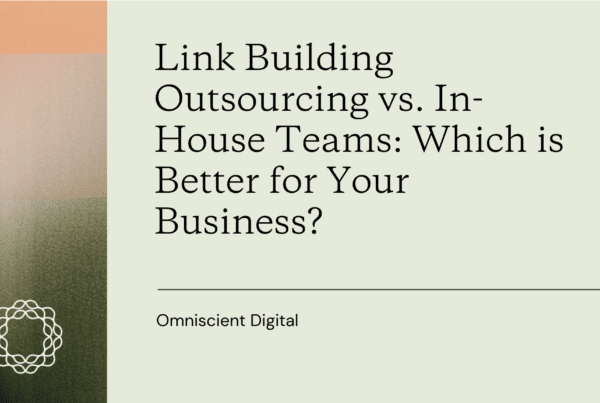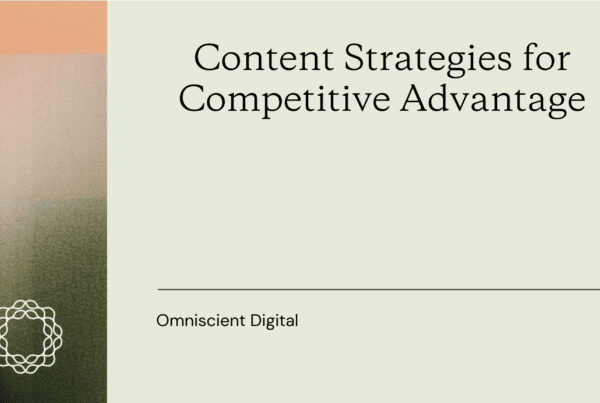
Subject matter experts (SMEs) offer a valuable perspective and dose of credibility to any content marketing program. On the rare occasion you can find an SME who also happens to be an excellent writer, it’s the equivalent of hitting the content jackpot. Other times, you have to figure out different ways to leverage the expertise of busy SMEs. So when will a regular writer suffice, and when do you need an expert?
On this episode of Kitchen Side, Alex, Allie, and David put their heads together to break down strategies that are rooted in their own past experiences.
Listen to the podcast
Watch the video
Scan the show notes
2:20 – SMEs get their hands dirty
Alex says that in his mind, the definition of a subject matter expert is an individual who does the work in question. The writer is the one who explains what the SME does to the world.
“So the difference between a content writer and a subject matter expert I guess like could best be illustrated by my time at CXL right. Like somebody who runs AB tests and somebody who writes about AB tests. And that person, like myself, could be the same. But most often I feel like that is separate, depending on the industry. But yeah, the subject matter expert is going to be the one kind of getting their hands dirty, doing the work and kind of knowing the specific industry kind of in and out. And the writer is going to be communicating that stuff to the world.”
6:56 – SMEs advertise a clear niche
Allie recently came across a data engineer who also writes. This is the perfect example of a two-for-one package. When seeking experts, they should advertise themselves as such.
“I would look at how they define themselves. That’s usually the first step that I would take is someone markets themselves as a freelance writer or content writer, versus like I’m a cannabis writer or I’m a psychedelic therapy writer or whatever. That usually is the first signal that they know how they’ve niched down and they know what they’re good at, or what they have experienced with, or they know what they specialize in. Secondly, I always asked for firsthand experience. I just hired someone for my own team at my other job. And they have firsthand experience in working with data, they’re like a data engineer. They do writing on the side. That was huge, is really important to me. Because I don’t have that knowledge. We can get into that later on, but I really enjoyed hearing not only like their portfolio pieces and like what they’ve written for and who they’ve been published under, but what they do at the day-to-day and what they’ve experienced, what they’ve had their hands on.”
9:29 – Hire writers for TOFU content
Allie thinks that writers are the best candidates for work that answers broad questions, while SMEs are better suited to BOFU content. That said, it depends on your audience.
“I would definitely say more, not necessarily a generalist, but definitely someone who specializes more on the writing side than the subject side would definitely be better equipped to tackle top of funnel, more of like, ‘What is?’ ‘Why is it important?’ ‘How to do this?’ Because really high level, it’s easy to research. There’s stuff that’s already out there. And they can build more of a narrative around those simple topics or high-level topics. But in the same vein, it really does depend on the audience. Because going back to my personal example, we have a subset of our audience that’s very technical. And if they read content that is obviously not written by someone who’s technical, even if it is top of funnel, they won’t trust that content. So now I don’t think it can only be broken up by the funnel. I definitely think like within each stage it depends on what subset of your audience you’re targeting with each stage of that content. So the audience I think comes into play a lot more than I think people realize.”
10:33 – Let your audience guide you
David knows firsthand that generic content marketing won’t cut it when it comes to savvy audiences like engineers. Those audiences don’t need fluff; they need best practice expertise.
“I think it also comes down to your strategy and the maturity of your company as well. Like there are some companies that might – like when I was at Fishtown Analytics and we were thinking about content for DVT, which is for data engineering and data transformation, we had an agency working on that content. And the way they wrote was very content marketing. If you’re a data engineer, you can sniff that out immediately. Like their headlines are like, ‘what is data transformation.’ And our audience doesn’t – they know what that is. They don’t need to be told that it is. They want to know how like the best practices and how, like how other companies do data transformation. So if that’s what your audience is looking for, but also if that’s sort of the brand you want to develop versus the one-on-one stuff, that’s where you can niche down. Because the top of funnel, one-on-one entry level content is really easy to create, so it’s very saturated. So it might be a strategic decision as well to say, hey. We know it’s not going to be high traffic, but we want to focus on SME like middle, bottom of the funnel content, because we know that that makes us experts in that content. And it demonstrates to our audience that we know our shit.”
13:06 – Hire writers for SEO-driven content
Allie notes that SMEs are a wealth of knowledge – but they aren’t always wired to think about things like SEO. Instead, use SMEs for other types of content like social media.
“I do think that generalist writers or writer-first folks tend to be better for SEO-driven content. Depending on the query it obviously always comes down to the keywords and the purpose of each piece of content, but I’ve found from experience that SME-driven content, when I have a true SME on my hands I’m not going to put them on that generalist stuff. Like I’m going to ask them to tackle the hard stuff, the stuff I don’t know, and honestly contribute some of their own ideas, whether or not it has to do with our product or service. But that’s some pretty valuable knowledge, and I’m not going to waste on like, what is, why is it important how to do it? But the trade-off is their writing might not fit into the perfect mold of like a keyword. You can’t always reverse engineer that kind of content into like a target SERP. So then I find that SME content is almost better for all other types of distribution: social, Quora, Reddit, YouTube, kind of like what we’re doing here. I think it’s actually more of a long game than people realize.”
14:32 – Tap SMEs for pure expertise
Alex recalls that during his time at CXL, the thought was to let SMEs share their knowledge without any constraints, filters, or guidelines. Instead, take their raw material and shape it into content that makes sense.
“When we would work with guest writers at CXL, it’s like we didn’t give them any guidelines or content briefs. We just let it rip, you know. Because we didn’t want to filter it through any of our own lenses. We just wanted their kind of pure expertise. And then you pull that in and hopefully you’ve got a good editorial process. And you can still, you know, append the keyword to that. Or you could basically like, you know, go through and change the title tag, the H2s and all that stuff. But I think if you have, yeah, like Allie was saying. If you have a subject matter expert, you just want their knowledge as unfiltered as possible, and then you can kind of format it the way you want it.”
17:00 – Hire writers that think like journalists
Alex says that writers who can outline a piece and then pull quotes from SMEs they know are very effective. That way, you can get the best of both worlds: strong writing and a unique and credible perspective.
“I think it’s very effective to think like a journalist in some of those cases. So you know you want to write about a topic. You know what you want to write about. I don’t know – let’s say how to how design content briefs or something like that. And you know the correct people to reach out to. You’ve got the framing for the topic. You can do the keyword research and get your content brief kind of – well this is getting meta – you’ve got your content brief in order, and then you can reach out to the people and sprinkle in those quotes…this is something I used to do as well again at CXL, is like, I wanted to know more people in the industry. So I didn’t do it on a podcast and I didn’t record any of it, but I used to just go get lunch with people twice a week. And I felt like I built some pretty good friendships that way. And I would often pull away interesting ideas from those conversations, and then loop back out and reach back out to them, you know, when I would actually write those topics. So I think like any conversation with a subject matter expert is a pretty good breeding ground for interesting ideas.”
19:33 – Search for SMEs & writers the same way
Allie doesn’t see the SME search as being notably different from the writer search. You simply need to know exactly what you’re looking for and pitch it appropriately.
“I don’t think finding SMEs is too terribly different than writers. It depends on the purpose. So if you want them to contribute content, I would say the outreach is pretty similar to the other ways that you recommended. I think it depends more on how you post your job ad, how you pitch your project, how you like poise what you’re looking for. Because the right folks will know how to find you. Like when I pitched this freelance writer I needed for my other job, I made it very clear. I was like, I would like somebody with this experience. I need someone to help me understand this stuff, to fill the gaps I can’t do myself. But that came down to me, that was my responsibility. Depending on if you’re looking for someone for like a podcast guest or a video interview, that process is somewhat different. I will say I have the best luck too on places like Quora – people answering questions for the sake of it just because they really know or care about a topic is huge. It doesn’t always promise a great writing style, but again, knowledge outweighs that. Especially if you can wrap up with some nice editing on the back end of their work.”
22:16 – SMEs have lots of thoughts, but little time
David made the point that while SMEs are a wealth of knowledge, they’re often so caught up in their day jobs that they can’t share it. That makes it extra helpful when a savvy writer can pick their brain.
“I’ve realized that some of the best SMEs have a lot of opinions and thoughts. And they’re like, oh, I should make time to write this. Or, I should turn this into a presentation, or I want to do more speaking. But it’s just like additional work for them that, you know, that the day job, they don’t really have time to put together a presentation or pitch themselves to speak. So oftentimes it’s flattering to have someone be like, Hey, I want to interview you on this. Because you know a lot about it, and you’re an expert. And it meets their goals of wanting to get their work out there as well. I think that hybrid of an SME who actually makes time to write is quite rare. Like I know for myself, in product, there are a lot of great product managers. Not all of them write stuff. And the ones who do end up kind of accelerating their career.”
24:13 – When contacting SMEs, be specific
Allie agreed that SMEs are busy people. If you are reaching out for quoted material, be prepared to be targeted in your ask and be respectful of their time.
“When I was at HubSpot, I really had to fine-tune. I had to like pull journalism skills out of I don’t know where. Because I wanted to leverage like a ton of internal and external SMEs, but I knew sending them a brief, sending them an open-ended question, asking even for a call, it sometimes didn’t work. I had to know what I wanted to write ahead of time, the specific questions I wanted to ask. If we were able to jump on a live call, I had to know how to get right to the root of what I needed from them, because they didn’t have a lot of time. And because they weren’t so content marketing minded, they were too busy executing on exactly what I wanted to know. So I think that’s another place where writers and SMEs can combine their skills. But I do think in the future, it’s even going to be more important for writers to know those skills. Because that’s where they’re going to deliver value is not in the generic top of funnel content, but more in like deciphering and basically translating SMEs and what they know into narratives, interviews, podcasts, stuff like that.”
32:34 – Hiring a writer? Look for one with SME experience
David said that a strong communicator who is comfortable working with SMEs can help your content program go far.
“If a company had to hire someone, I’d recommend they not hire a fresh college grad with like a journalism degree. I think it helps, but someone who’s more – I think someone who has really good communication, can do it in writing, is very curious, and maybe has a journalism background is worth a lot. Who can take really complex ideas and communicate well. And maybe it’s a prodigy fresh out of college, or maybe it’s someone who has been working for a couple of years and has worked with many SMEs. And that that person is going to take a content program to the next level. They’re going to be able to figure out what type of content to create with SMEs, or what questions to ask. Versus an SME, like they may have a lot of opinions, but it may not always be the best communicated. And that’s where a more generalist, experienced writer-slash-editor is invaluable.”
Connect with Omniscient Digital on social:
Twitter: @beomniscient
Linkedin: Omniscient Digital
Listen to more episodes of The Long Game podcast here: https://beomniscient.com/podcast/


